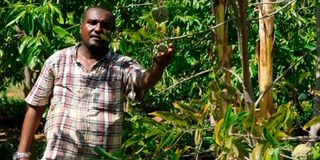Love for exotic fruits pays off for seedlings farmer

Yassin Yahya on his fruit farm in Kilifi County.
What you need to know:
- To ensure he ends up with quality seedlings, Yassin Yahya cleans the nursery regularly and sheds them from direct sun.
- He also uses good quality soil at the nurseries before the seedlings are transferred into the bags.
The sky is clear, showing no signs that it will rain soon, as the Seeds of Gold team drives towards Bwaga Bei Farm in Tezo, Kilifi County.
Yassin Yahya, 43, is on the one-acre farm checking on his tree seedlings and fruit trees when we arrive.
Yahya is keen to ensure that he has quality seedlings that he sells to farmers in Kilifi, Mombasa, and Kwale.
“We have over 80,000 exotic fruit seedlings and we are planting more. They include Indian bhagwa (1,500), Indian jujube 100, Sweet Egyptian pomegranate 3,000, Sweet Spanish pomegranate 1,500, Thailand guavas 600, Jamun 1,000, Soursop 3,000, Gmelina Arborea 500, figs 30, custard apples 100, plantain bananas 3,000, Taiwan pink guavas 5,000, pixie oranges 5,000 and tangerines 1,500," Yahya said.
He says he went into the business after buying fruit seedlings that he was misled were exotic yet they were not.
“I felt cheated and decided to grow my seedlings. My first order was worth Sh30,000 from outside the Coast and it had macadamia, pixie oranges, apples and tree tomatoes.”
“Most of these seedlings died and I was left with a single loquat tree that reminds me of my efforts,” he adds.

Yassin Yahya on his fruit farm in Kilifi County.
Yahya, however, did not give up. He raised Sh70,000 to establish a new nursery in 2020.
‘’I started by planting lemon seedlings for grafting. The initial stock was 500 seedlings but now I have 10,000 seedlings. These seedlings are good rootstock for tangerines, pixie oranges, and Mexican lime.”
His favourite fruit is the Indian bhagwa, a pomegranate variety that produces glossy red mature fruits.
“A customer at Marikiti market in Mombasa introduced me to the exotic fruits. He knew of my project and when he travelled outside the country, he returned with a variety of fruits. Now on all his trips abroad, he brings me different fruits that I extract seeds and grow,” says Yahya, who employs at least five workers on need basis.
To ensure he ends up with quality seedlings, he cleans the nursery regularly and sheds them from direct sun. Also, he uses good quality soil at the nurseries before the seedlings are transferred into the bags.
“The biggest threat to the seedlings are the leaf miner and mealybugs, which damage the leaves. Over-watering also causes root rot.”
Like the Spanish and Egyptian pomegranates that have succulent soft seeds, he sells Indian bhagwa seedlings from at least Sh200 each.
Ensure chances of survival
“The pomegranates have medicinal value thus good for people with diabetes and obesity. In the market the fruits go for up to Sh200 each and in a good season, a tree can produce up to 30 kilos.”
He sells the seedlings when they are 8 to 10cm to ensure high chances of survival, thus, earning him good income every month.
“We grow our seedlings organically, using cow urine, chilli, garlic, turmeric and dung as fertiliser and pesticides. For pesticides, we mix the contents in a drum of 2,000 litres for 30 days. Then the mixture must be stirred thoroughly and filtered. The concentrated liquid is diluted with 20 litres of water before use,” says Yahya, who also works closely with agricultural extension officers for quality seedlings.
He also manufactures seaweed fertiliser, which he makes after collecting weeds from the deep sea and ferments them in a drum for 30 days.
“This fertiliser has more than 70 micro and macro nutrients. The price is Sh1,500 per five litres. It is best for the improvement of plant health, curbing stress, diseases and pests.”
Pius Mwadziwe, a county agricultural extension officer in Rabai, notes fruit seedlings give better returns that those of vegetables.
“But one needs extreme patience to maximise on returns as they take time to mature.”





